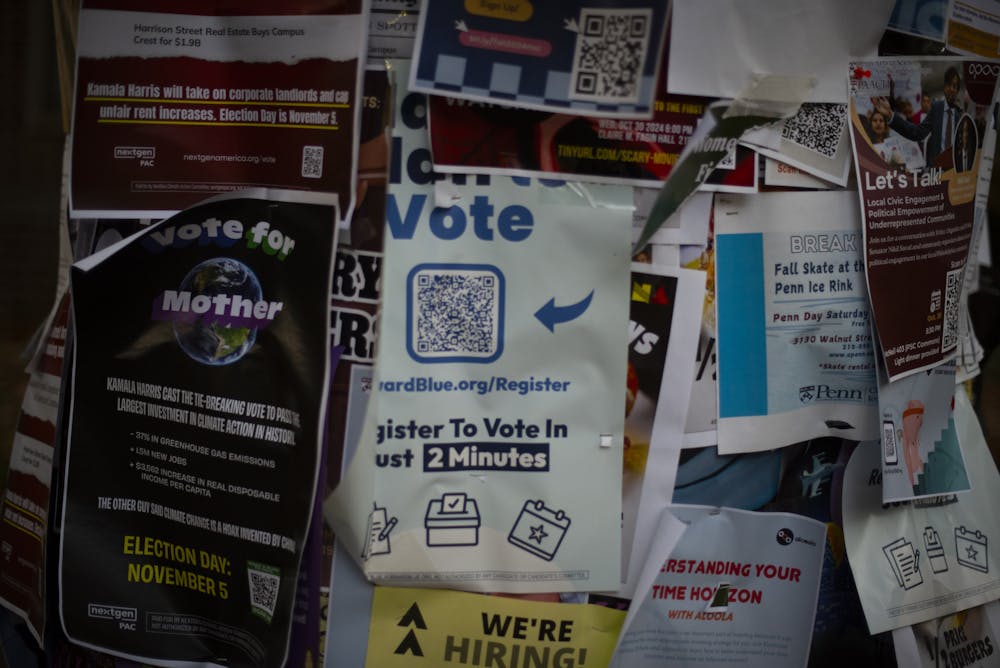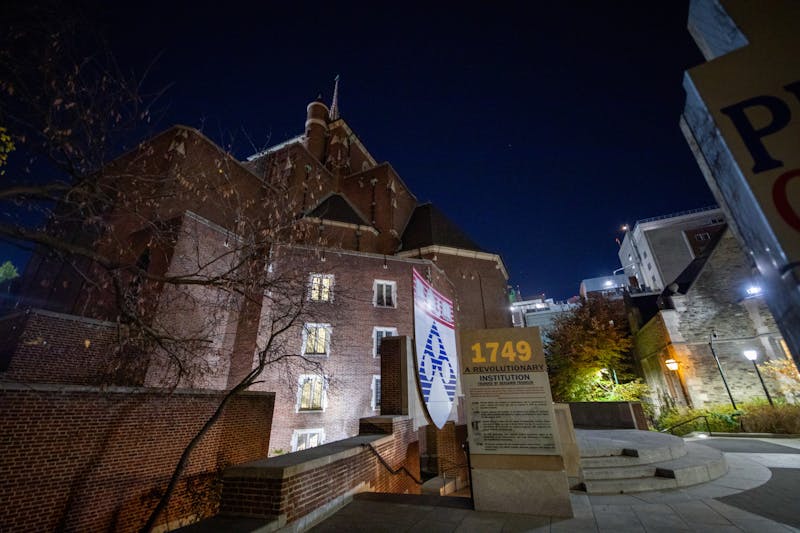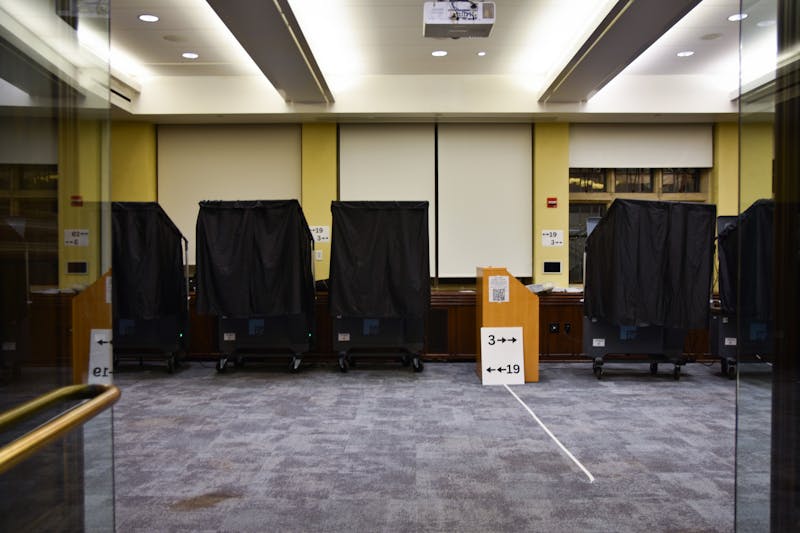
A supermajority of Penn students plan on voting for Vice President Kamala Harris in the 2024 presidential election, according to a survey by The Daily Pennsylvanian.
The DP conducted an anonymous student survey from Oct. 11 to Oct. 18 and collected responses from over 900 Penn undergraduates. The survey found that 79% of Penn students plan to vote for Harris in the 2024 presidential election, while 12% of surveyed students plan to vote for former President and 1968 Wharton graduate Donald Trump. The remaining 9% of respondents said they plan to not vote or vote for a third-party candidate.
79% of Penn students plan to vote for Harris
The prospect of another Trump term is a key factor motivating many Penn students to vote for Harris. Several students told the DP that they fear Trump could endanger the future of American democracy.
“To do the utmost to preserve [the democratic system] would be to vote against Donald Trump,” College senior Jordan Ortiz said. “I think his ability to sow doubt in our electoral process has been demonstrably destructive.”
College and Wharton first year Doer He, who is a DP staffer, expressed a similar point of view. He called Harris “likely the best choice, or at least the less worse of the two choices, in terms of protecting our democracy.”
Trump performs best among Wharton and Engineering students
Across all undergraduate schools, the vast majority of students plan on voting for Harris. Harris’ support is highest among students in the College of Arts and Sciences and the School of Nursing, while Trump’s support is highest among students in the Wharton School and the School of Engineering and Applied Science.
College first year Tareque Chowdhury told the DP he feels inclined to vote for Harris, citing foreign policy as his top issue — and the Russia-Ukraine war in particular. He also described Harris’ foreign policy as “more refined than Trump’s.”
Alex Guzman, a College senior, feels motivated to vote partially due to Harris’ commitment to creating affordable housing and her openness to a ceasefire in Gaza.
“As a young person, I very much appreciated her discussions on cost of living … and her plans to work with contractors and local governments to build millions of new housing units by the end of her first term,” he said.
Most respondents to the survey were Democrats
When asked about their party affiliation, about six in 10 Penn students identified as Democrat, while one in 10 identified as Republican and two in 10 said that they are independent.
67% of respondents who identified as independent said they would vote for Harris. Among Republican students, a majority stood by Trump, but 18% said they plan on voting for Harris. Additionally, 56% of students who identified their party affiliation as “something else” said they will vote for Harris, while 23% do not intend to vote, and 21% plan to support a third-party candidate.
Abortion was the top issue for Penn students, with inflation more important among Republicans
Abortion was the most important political issue for Penn students, with 22% of all respondents selecting it as the issue that matters most to them right now. “Threats to democracy” at 20% and inflation at 19% were the other top issues for Penn students. 83% of students who said that abortion was their top issue identified as women.
Among students who plan on voting for Harris, abortion was similarly the most popular issue at 26%, followed by “threats to democracy” at 24%. On the other hand, 48% of students planning to vote for Trump marked inflation as their most pressing issue.
College first year Kaison Wills said they are voting for Harris to protect their reproductive rights and the LGBTQ+ community.
“I feel that it is my right to choose what I do with my body,” Wills said. “I am also voting to protect my identity as a nonbinary individual because I know that the Republican Party does not have the brightest sights for people in the LGBTQ community.”
They said it was important to have a president who supports LGBTQ+ rights, especially for those living in conservative areas like their hometown of Johnstown, Pa.
Penn students show stronger support for Harris compared to the broader Generation Z population — of whom only 50% said they would vote for Harris in the election, according to an August NBC News poll. Students also show a different distribution of issue priorities. Abortion was students’ top issue, while respondents in the Gen Z survey listed inflation as their top issue by a 20% margin.
Marc Trussler, the director of data sciences at Penn’s Program on Opinion Research and Election Studies, helped conduct the NBC poll and said that Penn’s results are “way more pro-Harris than 18-to-29 year olds generally.”
Higher-than-average family incomes at Penn and the overall college environment may explain why Penn student respondents placed less of an emphasis on inflation as a top concern, Trussler said.
“I think it’s fair to say, on average, Penn students come from a higher income background than most Gen Z people … and being in college, you’re a little bit insulated from the economic conditions,” Trussler said. “You don’t have the same kind of bills and grocery shopping shocks.”
A majority of Penn students ‘strongly approve’ of Joe Biden’s decision to drop out of the presidential race
Despite partisan differences, 92% of Penn undergraduates said they approve of President Joe Biden’s decision to drop out of the presidential race, including 72% who strongly approve. Furthermore, 79% of respondents who said they are Democrats strongly approved of the decision.
“Clearly, this is a very pro-Democratic group of people, and they want to win … they perceive that the switch from Biden to Harris has increased the odds of a Democrat being in the White House,” Trussler said.
Most Trump voters disapprove of campus pro-Palestinian activism, while most Harris voters approve
Opinions on campus activism at Penn were split across party lines. 61% of Trump voters at Penn expressed strong disapproval of pro-Palestinian activism on campus. Harris voters were more split on the issue, with 36% somewhat approving and 28% expressing strong approval. Overall, a narrow majority of students, 57%, said that they somewhat or strongly approve of pro-Palestinian activism on campus.
“There’s a lot of people at Penn who hold a lot of different, diverse views,” Ortiz said. “I think the first step to making [our political environment] a more healthy, hospitable place is to take a second, talk to your friends, talk to your family … understand other people’s views that are different from your own. That’s the key, I think, to a healthy democracy.”
The Daily Pennsylvanian’s 2024 student voter survey of 902 undergraduate students was conducted online using Qualtrics from Oct. 11 to Oct. 18. A structured questionnaire was used to collect data and all responses were self-reported. The sample was collected independently by the DP and non-probability sampling methods were used. The survey link was distributed through announcements from professors, student-to-student communication, Instagram, and the DP Daybreak newsletter. Although the traditional margin of error for a sample size of 902 is plus or minus 3.3 percentage points, this non-random sample likely carries a higher margin of error. The findings may not be generalizable to all Penn students.
The survey was weighted by the DP using the R “anesrake” package. First, the sample was checked for quality. We dropped 121 responses to only include verified undergraduate students and non-duplicate responses. Second, the sample was weighted to match race, gender, class year, and school targets for Penn undergraduates. The targets for these variables were collected from two sources. Race and gender target estimates come from Penn’s 2023-24 Common Data Set. Class and school target estimates come from MyPenn, the University’s alumni network app. Interviews were conducted by reaching out to respondents who indicated their willingness to participate in a follow-up and provided their contact information on the survey. Those who responded to interview requests were included in the article on a first-come, first-served basis.
The Daily Pennsylvanian is an independent, student-run newspaper. Please consider making a donation to support the coverage that shapes the University. Your generosity ensures a future of strong journalism at Penn.
Donate











